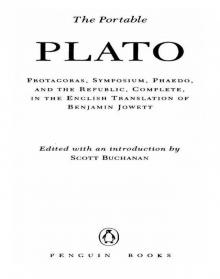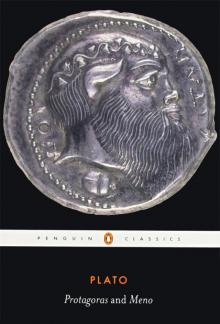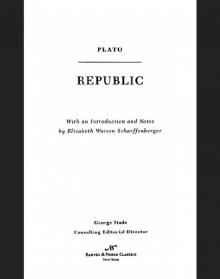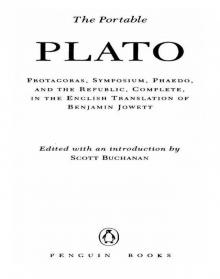Protagoras and Meno Read online
PROTAGORAS AND MENO
PLATO stands, with his teacher Socrates and his pupil Aristotle, as one of the shapers of the entire intellectual tradition of the West. Born c. 427 BC, he came from a family that had long played a prominent part in Athenian politics, and it would have been natural for him to follow the same course; the reason for his not doing so, according to the seventh of the collection of letters attributed to him (all of them almost certainly inauthentic), was his disillusionment with the kind of politics that could lead, among other things, to the execution – in 399 – of Socrates. Rather less plausibly, the same letter suggests that Plato's several visits to the court of Dionysius 11, tyrant of Syracuse in Sicily, were motivated by a desire to put his political theories – as developed above all in his masterwork, Republic – into practice. The reform of society on an ethical basis certainly remained one of his central theoretical concerns. However, the focus of his thinking was on ethics itself, in which he first followed and then went beyond Socrates, and on metaphysics and the understanding of reality. In the mid-380s, in Athens, he founded the Academy, the first permanent institution devoted to philosophical research and teaching, and an institution to which all Western universities like to trace their origins.
Plato wrote more than twenty philosophical dialogues, appearing in none himself (most have Socrates as chief speaker). His activity as a writer seems to have lasted over half a century; few authors in any language could claim to rival his particular combination of brilliant artistry and intellectual power. He died in 347 BC.
ADAM BERESFORD studied Classics at Balliol College, Oxford. He taught Latin and Greek at Dulwich College, London, from 1993 to 1995, and received a doctorate in Philosophy from Oxford in 2002. He teaches Philosophy and Classics at the University of Massachusetts, Boston.
LESLEY BROWN is Centenary Fellow in Philosophy at Somerville College, Oxford, and the author of numerous articles and book chapters on Plato and Aristotle.
PLATO
Protagoras and Meno
Translated by ADAM BERESFORD
with an Introduction by LESLEY BROWN
PENGUIN BOOKS
PENGUIN CLASSICS
Published by the Penguin Group
Penguin Books Ltd, 80 Strand, London WC2R 0RL, England
Penguin Group (USA) Inc., 375 Hudson Street, New York, New York 10014, USA
Penguin Group (Canada), 90 Eglinton Avenue East, Suite 700, Toronto, Ontario, Canada M4P 2Y3 (a division of Pearson Penguin Canada Inc.)
Penguin Ireland, 25 St Stephen's Green, Dublin 2, Ireland (a division of Penguin Books Ltd)
Penguin Group (Australia), 250 Camberwell Road, Camberwell, Victoria 3124, Australia (a division of Pearson Australia Group Pty Ltd)
Penguin Books India Pvt Ltd, 11 Community Centre, Panchsheel Park, New Delhi – 110 017, India
Penguin Group (NZ), cnr Airborne and Rosedale Roads, Albany, Auckland 1310, New Zealand (a division of Pearson New Zealand Ltd)
Penguin Books (South Africa) (Pty) Ltd, 24 Sturdee Avenue, Rosebank, Johannesburg 2196, South Africa
Penguin Books Ltd, Registered Offices: 80 Strand, London WC2R 0RL, England
www.penguin.com
This translation first published in 2005
5
Translation and editorial material © Adam Beresford, 2005
Introduction copyright © Lesley Brown, 2005
All rights reserved
The moral right of the translator has been asserted
Except in the United States of America, this book is sold subject to the condition that it shall not, by way of trade or otherwise, be lent, re-sold, hired out, or otherwise circulated without the publisher's prior consent in any form of binding or cover other than that in which it is published and without a similar condition including this condition being imposed on the subsequent purchaser
ISBN: 9781101489109
Contents
Chronology
Introduction
Further Reading
A Note on the Translations
PROTAGORAS, or The Sophists
MENO, or On Being Good
Appendix
Glossary
Notes
Chronology
The rough idea we have of the chronology of Plato's life and career is partly based on guesses made from his own writings. For other details we rely on ancient biographies, all of them written over four hundred years after his death (which we hope are partly based on earlier sources) and on the letters attributed to him, which may or may not be genuine. Dates for the composition of the many dialogues that he wrote are speculative, but scholars broadly agree on whether a given work comes from earlier or later in his career, and that the dialogues may be divided roughly into three groups. Protagoras and Meno probably both date to the 380s BC, along with four other works that are similar in length and style and touch on many of the same themes: Euthydemus, Symposium, Gorgias, Phaedo. Together these make up a set that represents his most ambitious work as a dramatist and some of his most original and inventive philosophy. Also given here are a few dates that are relevant to the historical and dramatic settings of these particular dialogues.
c. 468 BC Birth of Socrates.
450s – 430s Athens, as a flourishing democracy, under the leadership of Pericles, becomes the dominant power in the Aegean.
432 Dramatic date for the Protagoras. (It is set nearly fifty years before the date of its composition.)
431 Start of the Peloponnesian War (between Athens and Sparta).
430–429 Athens is hit by a catastrophic plague. Pericles dies.
c. 427 Birth of Plato, into a wealthy and aristocratic family.
c. 410s Plato first comes under the influence of Socrates.
415 Athens suffers a heavy defeat in an over-ambitious naval expedition against Syracuse, in Sicily.
404 Athens is decisively defeated by Sparta; the democratic government is replaced by a dictatorial oligarchy – ‘The Thirty Tyrants’ – which includes two of Plato's close relatives, Critias and Charmides. (There is a tradition that Plato was invited to take part, and refused.) Within a few months there is a civil war, and the oligarchy is overthrown by the democratic faction, led by Thrasybulus and Anytus, among others. The democracy is restored.
402 (early) Dramatic date for the Meno.
402 Cyrus, ruler of Asia Minor, and brother of Artaxerxes, the Persian king, attempts to oust his brother. He leads a large expeditionary force into the heart of Persia, partly made up of Greek mercenaries, including Meno, who serves as a general.
401 Cyrus' expedition fails. Meno is captured and executed.
399 Socrates is prosecuted by Anytus and two others. The charges are that he ‘doesn't believe in the gods of the city’ (a charge which implies subversion of traditional moral values) and that he ‘corrupts young people’. He is found guilty, in a public trial, by a jury of 500 Athenian citizens, and sentenced to death. Socrates' death may have prompted Plato to give up on the idea of entering political life, and devote himself fully to philosophy. It also seems to have given him a deep mistrust of democratic institutions.
389–388 Plato travels to Sicily and southern Italy, where he visits and is influenced by Pythagorean schools there. (Pythagoreans believed in reincarnation, and apparently combined an interest in mathematics and geometry with number mysticism.)
390s–380s Probable period for Plato's composition of Socrates' Defence Speech (Apology), Euthyphro, Crito, Charmides, Cratylus, Hippias Minor, Menexenus, Ion, Laches, Lysis, Protagoras, Euthydemus, Meno, Gorgias, Symposium and Phaedo.
c. 387 Plato founds the ‘Academy’ in Athens, a kind of philosophical school and proto-university (so named after its location in a grove sacred to Academos, just outside the
city).
380s–370s Probable period for the composition of Republic, Phaedrus, Parmenides, and Theaetetus.
367 Plato visits Sicily again, at the invitation of his former pupil Dion, the uncle of Dionysius II, king of Syracuse. (Some ancient biographers say that Plato and Dion planned to educate the young Dionysius, and turn him into a ‘philosopher-king’ – and that the experiment was a dismal failure; also that Plato returned to Syracuse in 361 and tried one more time to influence Dionysius, with the same result.)
360s – 350s Probable period for composition ofSophist,Statesman, Timaeus, Critias, and Laws (known to be Plato's final work).
347 Plato dies.
Introduction
Plato was born in Athens in 427 BC into a wealthy and politically prestigious family. Athens was then at the height of her power and wealth, buzzing with new intellectual and cultural movements, and attracting leading thinkers and artists from all over the Greek world. Twenty-three years later, Athens had suffered a final defeat in the long wars against Sparta and her allies, and in 399 BC, before Plato was thirty, the newly restored democracy tried and executed Socrates, whose teachings and mode of life had such a profound influence on Plato and his other followers. In their dramatic settings, these two dialogues span this critical period. The Protagoras is set in about 432 BC, in the golden age of Pericles on the eve of the war that swept it away; the Meno is set in 402 BC, just after Athens' final defeat, and foreshadows Socrates' imminent trial and death.
The charges against Socrates, then aged seventy, were that he corrupted the youth of Athens and that he did not worship the city's gods. According to Plato's Apology, his version of the speech Socrates gave in his own defence at his trial, he strenuously denied these charges. Though he apparently wrote nothing, he was a leading member of the intellectual circles of his day. The Socrates of Plato's dialogues – at least of these ones – is an affable, ironic and infuriating questioner. He always claims he knows nothing at all about the serious questions he raises; he treats the people he talks to as his equals, and as partners in the search, and constantly asks them for their opinions, usually to show that they are hopelessly confused. He believes in moral inquiry and self-examination, and in the unique power of dialogue and of reason to advance human understanding.
Socrates was not a professional teacher but offered his conversation free of charge. Plato's writings very often aim to set him apart from the class of professional experts known as sophists. These sophists, three of whom are portrayed in the Protagoras, were often influential political figures in their own cities. They made huge names for themselves, and great fortunes, giving displays of their intellectual prowess and new ideas all over Greece. Sophists competed for fame and influence, and charged large fees for instruction in the various kinds of expertise they claimed to impart – which might include literary criticism, geometry, astronomy, music or even grammar. They were opening up new intellectual areas, and challenging the traditional forms of knowledge, with theories such as Protagoras' relativism: the claim that man is the measure of all things. Some, including Protagoras, claimed they could teach young men to become good: what exactly this entailed was a subject of considerable debate and disagreement, and forms the theme of our two works. But it certainly involved teaching ambitious young men the skills needed to make waves and acquire political influence, especially the art of public speaking, in an era when being a fine orator was key to a successful political life. Whether the sophists offered anything more – and in particular whether, like Socrates, they offered any kind of ethical instruction – was a question that greatly interested Plato. He presents Protagoras (whom he treats with more respect than most) as claiming to be an expert on ethical matters – and the investigation of that claim forms a theme of the work.
Apart from the Apology, Plato's writings are all cast in the form of dialogues, most of them with Socrates as the main speaker. They were written after his execution, in part no doubt to champion and celebrate him as a brilliant thinker and as one for whom the philosophic way of life was a matter of the utmost moral seriousness. But the reader should not expect faithful representations of discussions and doctrines actually held by Socrates, tempting though it is to speculate as to whether he actually encountered Protagoras, what they discussed and whether Socrates really held the views we find him putting forward in these dialogues.
Plato is unsurpassed as an original thinker and writer, and the Protagoras and Meno are among the best introductions to his thought and writings. They are closely linked in subject matter, each exploring the question of being good: What is it? What is the relation of its parts (such as bravery, or respect for what's right, or wisdom) to being good as a whole? How can a person hope to become good? Can some form of teaching make us good? However, each dialogue exemplifies a different facet of Plato's literary skill. In the Protagoras, we have Socrates describing to an unnamed friend two meetings: a private one with a young would-be student of Protagoras, and another, public gathering at which Socrates enters into a debate with the great sophist, while other luminaries gather round, each showing off and trying to grab the limelight in the manner of intellectuals then and now. The device of making Socrates the narrator allows him some knowing comments on how his and others' remarks were delivered and received, and the whole narration is a sparkling tour-de-force. The Meno, on the other hand, is in straight dramatic form: Socrates and the young, self-centred Meno address each other directly, and Meno's changing attitudes – at first he is cocky and self-assured, then demoralized, and finally a reinvigorated if chastened coinquirer – are presented directly in the exchanges between the two.
The Protagoras
In the Protagoras, the main drama, the exchange between Socrates and Protagoras, is preceded by a brief but important prelude, a private discussion between Socrates and Hippocrates, who is so impatient for an introduction to the famous sophist that he wakes Socrates before dawn. What does the young man hope to learn from associating with Protagoras? Socrates shows him that he has a very limited grasp of what it is that he wants, and of what a sophist can do for him. But they set off to see Protagoras all the same. Their arrival is a scene lifted from Greek comedy: they are blocked at the door by a grumpy slave before gaining entry to the house of Callias (a young millionaire who likes to throw his money at sophists) and the assembly of intellectuals. There follows a description of the three ‘professors’; Protagoras walking, flanked by his deferential followers; Hippias, seated and addressing his from on high; Prodicus, pontificating to his admirers while wrapped up in bed. Everyone gathers round to hear the discussion between Socrates and Protagoras, which centres on this question: What will Protagoras teach the young Hippocrates?
‘The very day you start your tuition, you'll go home better than you were before’ – but better at what? ‘Good decision-making, in private and public affairs.’ Being a good citizen, then, is what Protagoras professes to teach, but Socrates wonders if this is really teachable. After all, the democratic assembly at Athens recognizes experts in technical matters but none, apparently, in what it takes to be a good citizen. Everyone (not just a few ‘experts’) is allowed to have a say on civic and ethical matters.
Protagoras’ reply – a ‘display-speech typical of sophists – opens with a myth, a ‘Just-So’ story about the origin of morality. He skilfully negotiates the traps Socrates has laid for him. To defend his own profession, he must argue that being good is teachable, but he also wants to support the democratic policy of allowing anyone to speak on civic matters. His solution: to claim that being good can be and indeed is taught, but that in a civilized society everyone learns it – through teaching. His ‘story’ tells how human beings missed out on being endowed with natural defences (such as wings, claws or a tough skin) but, as a thoughtful compensation, were given fire, and technical skill, by the god Thinxahead (Prometheus). However, these still were insufficient for humans to thrive and defend themselves against wild animals, because they couldn't co-operate
and kept fighting each other. Only a further gift, direct from Zeus, saved humankind from destruction: the gift of aidós and díkë: a sense of right and wrong. Importantly, Zeus instructed his messenger Hermes to give this not just to a few people but to everyone; and this universal sense of right and wrong – the foundation of civil society – was to be our salvation.
Protagoras next underlines the story's meaning. Athenians are correct to regard everyone as being good, to at least a minimal degree, not by nature but through teaching. So who teaches people how to be good? Everyone. Everyone who in civil society takes part in bringing up children – mothers, nurses and neighbours – because ‘we benefit from people being good to one another’ (327b). This socialization is both a product of, and a prerequisite for, civil society. Hence in the story it is represented as a late gift from Zeus, not one with which human beings were endowed from the start, but one they acquired only after a period of unsuccessful attempts to live in groups. The speech ends with an ingenious explanation of why the sons of good men don't turn out good themselves despite their fathers' efforts – evidently a topic of some currency, discussed also in the Meno as a stumbling-block for the view that you can be taught to be good. The speech is a brilliant presentation of an essentially common-sense view that equates being good with socially instilled decent behaviour. It proposes that the sense of right and wrong is necessarily widespread since it arises, ultimately, from an instinct for the mutual respect and cooperation needed for communal living. But this kind of being good – possessing a basic ethical sense and minimally decent behaviour – has little to do with what ambitious young men would pay Protagoras good money to learn from him, a problem the speech skirts over rather unconvincingly. Nor is it enough for Socrates, who aspires to something much more intellectually grounded and much less commonplace.

 The Portable Plato - Protagoras Symposium Phaedo The Republic
The Portable Plato - Protagoras Symposium Phaedo The Republic Protagoras and Meno
Protagoras and Meno Republic (Barnes & Noble Classics Series)
Republic (Barnes & Noble Classics Series) The Last Days of Socrates
The Last Days of Socrates The Portable Plato
The Portable Plato